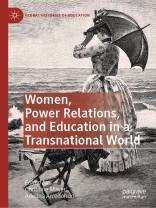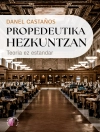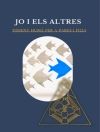This edited collection addresses the nexus of gender, power relations, and education from various angles while covering a broad spectrum of the history of education in both time and geographic space. Taking the position that historians of gender and education find the concept of transnationalism very useful for a deeper understanding of historical change and situations, the editors and their contributors employ a transnational perspective to explore the complex and entangled dimensions of a history of education that transcends regional and national boundaries through a variety of approaches (e.g. through exploring new fields of research, sources, questions, perspectives for interpretation, or methodologies). In doing so, they also undertake to open up a transnational global perspective for the historiography of education.
Tabla de materias
1. Introduction.- 2. ‘The Measure to Rank the Nations in Terms of Wealth and Power?’ Transnationalism and the Circulation of the ‘Idea’ of Women’s Education.- 3. The Differentials of Gendered Social Capital in Indian Literacy-Educational Activism, 1880-1930: Renewing Transnational Approaches.- 4. French Catholic Teaching Sisters Go International: Rereading Histories of Girls’ Education Through a Political and Transnational Lens.- 5. Writing Home to the American Board of Commissioners for Foreign Missions: Missionary Women Abroad Narrate Their Precarious Worlds, 1869-1915.- 6. Julia Lloyd and the Kindergarten: A Local Case Study in a Transnational Setting.- 7. The Transnational Roots of the Froebel Educational Institute, London.- 8. The Greeks Girls’ School Arsakeion as a Case Study in its National Role during the Balkan Wars (1912-1914).- 9. Suffragist Mother-Teachers: Familial and Professional Identity Through the Entangled Historical Lens of Mandatory Palestine, 1918-1926.- 10. Women Educators’ Sojourns Around the British Empire from the Interwar Years to the Mid-Twentieth Century.-
Sobre el autor
Christine Mayer is Professor Emeritus of Theory of Education and Gender at the University of Hamburg, Germany. She has written numerous articles on education, vocational education, gender, and on women’s and children’s work in the eighteenth and nineteenth centuries, as well as on the relationship between educational thoughts and gender anthropology in the era of Enlightenment. Her current research focuses on the transnational and transcultural circulation and transfer of educational ideas and practices.
Adelina Arredondo is Professor at the Institute of Sciences of Education, Universidad Autónoma del Estado de Morelos, México, and a member of the National System of Researchers. She has served in the executive committees of the Mexican Society of History of Education, the National Council of Educative Research, and the International Standing Conference of History of Education, where she has been Co-convenor of SWG “Gender and Education” (2011-2016) and of the SWG ‘History of Secular (laic) Education’ (2017-2022).












